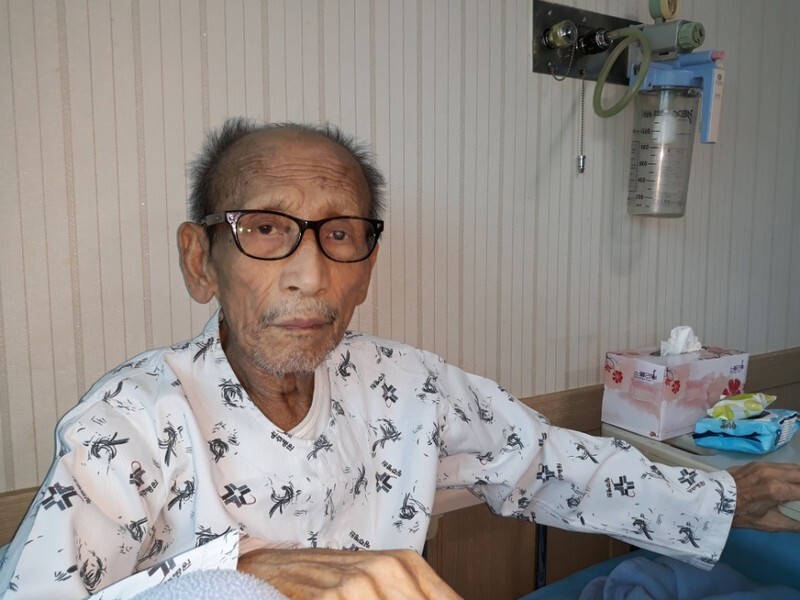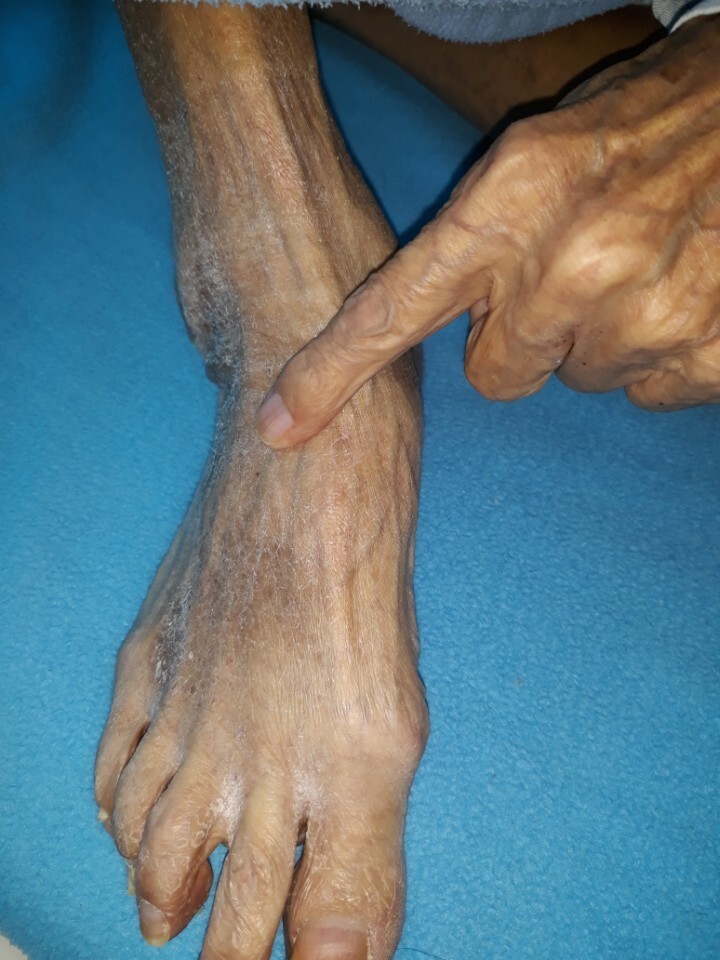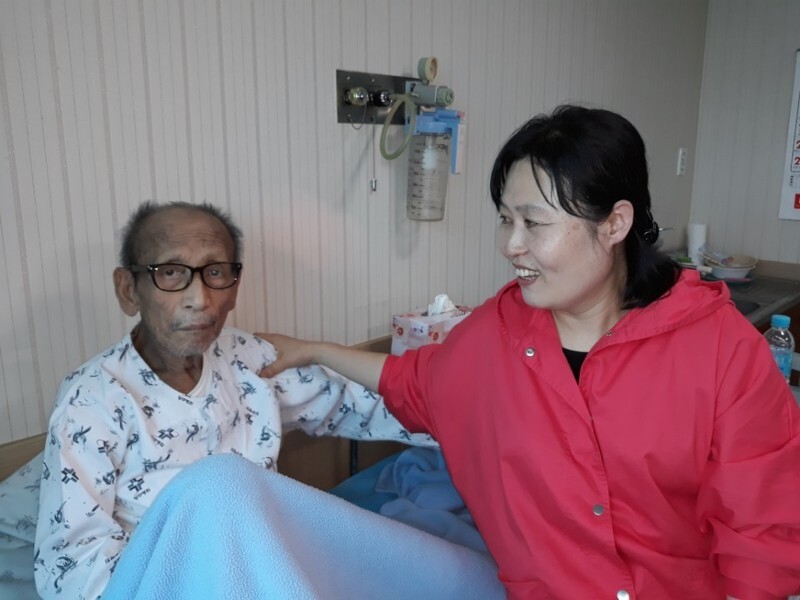hankyoreh
Links to other country sites 다른 나라 사이트 링크
South Korea’s oldest unconverted prisoner hospitalized for treatment

He longed to see her, if only in a dream. Even now, the image of his wife’s face passes through his mind as he last saw her 57 years ago. Every now and then, he feels pangs of regret for not seeing her in the hospital before passing to South Korea in Aug. 1961. Apartment No. 8 on the fifth floor, visible just across the Taedong River in Pyongyang’s Songyo village, was the house where he lived.
“It’s strange. I long to see [my wife] so badly, yet she never appears in my dreams,” said Seo Ok-ryeol on Apr. 24. At 90, the resident of the Gakhwa neighborhood in Gwangju’s Buk (North) district is the oldest of South Korea’s unconverted long-term prisoners.
Seo has recently been hospitalized for treatment of water in his lungs. His face appeared gaunt that morning at his hospital in Gwangju’s Buk district; his hands and feet had been reduced to skin and bones. Unable to eat very much, he refuses to take medicine. On overcast days, he suffers the aftereffects of torture.
“Look at this. My bones aren’t normal,” he said. “I didn’t know when I was younger. Now that I’m older, I get symptoms.”
Seo’s last wish is to see his wife and two sons before he dies. Born in 1956 and 1958, the boys were five and three years old respectively when he left. Will he ever get the chance to see them again?

Seo is a living embodiment of the scars of Korea’s division. Born in Sinan, South Jeolla Province, he was an economics student at Korea University who enlisted in the North Korean People’s Army when the Korean War broke out in 1950.
He was teaching at a middle school in Chonnae County in North Korea’s Kangwon Province when he met, fell in love with, and married a “lady schoolteacher” born in 1930. In 1961, he was sent to as an agent to the South, where he was captured while visiting his childhood home. Indicted on charges of violating the National Security Act, he spent 29 years in prison.
“Darling! I’m dying to know if you are still alive,” Suh wrote to his wife in a 1998 letter that he has never been able to send.
Recently, Seo has been clinging tightly to a slender ray of hope. He believes that the issue of his repatriation could be resolved if an upcoming inter-Korean summit on Apr. 27 results in a thaw on the Korean Peninsula.
“I don’t know how long I have left, but I want to see my family again for the last time before I die. At the very least, I hope they’ll give me the chance to see their faces as a humanitarian gesture,” he said.
Jeong Gyeong-mi, 47, has been friends with Seo since interviewing him in 1992 when she was a university student reporter.
“His memory comes and goes these days, but a few days ago he said, ‘I can’t die yet.‘ It broke my heart,” she said.
Seo is one of 19 people who hope to return to the North. Only 19 people remain alive from the second group of 33 people requesting repatriation after 63 unconverted long-term prisoners were returned per the June 15 Joint Declaration agreed upon at the first inter-Korean summit in 2000. All of them are in their eighties or nineties and were supposed to be included in the first group – but either were unable to apply because they could not be reached, or missed the repatriation window after conservative objections to claims that they had been coerced into converting through violent tactics by the state.

“The existence of unconverted long-term prisoners is a product of division and the Cold War,” declared the Minkahyup (Members of the Family Conference for Implementation of Democratization) prisoner of conscience support association, Korea Alliance for Progressive Movement, and other groups at an Apr. 18 press conference on the plaza in front of the Blue House.
“In the spirit of love for fellow Koreans and humanitarianism, we must quickly repatriate these 19 people,” the groups urged.
By Jung Dae-ha, Gwangju correspondent
Please direct questions or comments to [english@hani.co.kr]

Editorial・opinion
![[Guest essay] Amending the Constitution is Yoon’s key to leaving office in public’s good graces [Guest essay] Amending the Constitution is Yoon’s key to leaving office in public’s good graces](https://flexible.img.hani.co.kr/flexible/normal/500/300/imgdb/original/2024/0416/8917132552387962.jpg) [Guest essay] Amending the Constitution is Yoon’s key to leaving office in public’s good graces
[Guest essay] Amending the Constitution is Yoon’s key to leaving office in public’s good graces![[Editorial] 10 years on, lessons of Sewol tragedy must never be forgotten [Editorial] 10 years on, lessons of Sewol tragedy must never be forgotten](https://flexible.img.hani.co.kr/flexible/normal/500/300/imgdb/original/2024/0416/8317132536568958.jpg) [Editorial] 10 years on, lessons of Sewol tragedy must never be forgotten
[Editorial] 10 years on, lessons of Sewol tragedy must never be forgotten- [Column] A death blow to Korea’s prosecutor politics
- [Correspondent’s column] The US and the end of Japanese pacifism
- [Guest essay] How Korea turned its trainee doctors into monsters
- [Guest essay] As someone who helped forge Seoul-Moscow ties, their status today troubles me
- [Editorial] Koreans sent a loud and clear message to Yoon
- [Column] In Korea’s midterm elections, it’s time for accountability
- [Guest essay] At only 26, I’ve seen 4 wars in my home of Gaza
- [Column] Syngman Rhee’s bloody legacy in Jeju
Most viewed articles
- 1[Guest essay] Amending the Constitution is Yoon’s key to leaving office in public’s good graces
- 2Faith the power of memory: Why these teens carry yellow ribbons for Sewol
- 3[Guest essay] How Korea turned its trainee doctors into monsters
- 4[Editorial] 10 years on, lessons of Sewol tragedy must never be forgotten
- 5US grants Samsung up to $6.4B in subsidies for its chip investments there
- 6[News analysis] Watershed augmentation of US-Japan alliance to put Korea’s diplomacy to the test
- 7How Samsung’s promises of cutting-edge tech won US semiconductor grants on par with TSMC
- 8Korea ranks among 10 countries going backward on coal power, report shows
- 9‘National emergency’: Why Korean voters handed 192 seats to opposition parties
- 10[Column] A death blow to Korea’s prosecutor politics